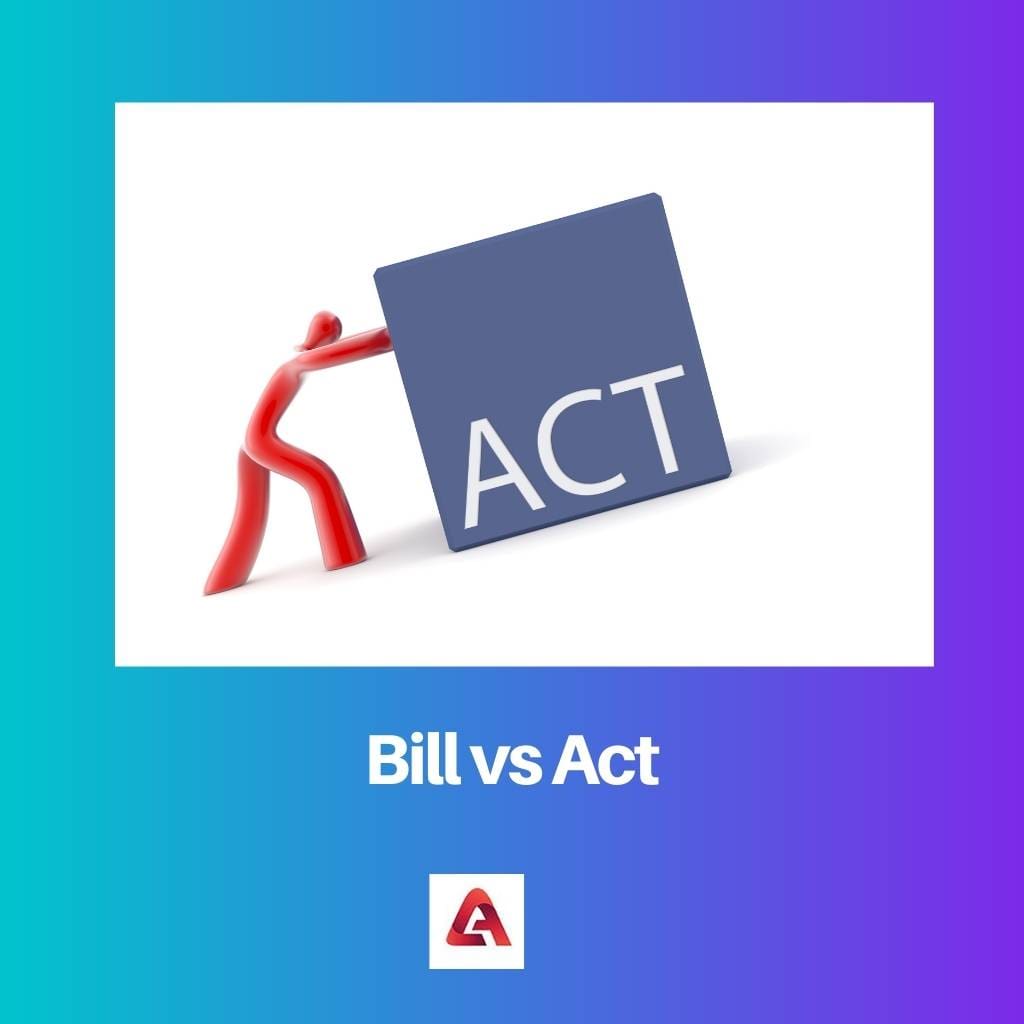All countries have their separate laws and acts for the protection of the citizens that they have to obey; otherwise will be punished for breaking them.
But the confusion sometimes arises whether laws and acts are the same things or not. Most people use act and bill interchangeably due to a lack of proper knowledge.
Although they have similarities, that does not make both terms mean the same; therefore, from a legal perspective and generally, also the difference between act and bill is important to understand.
Key Takeaways
- A bill is a proposed law presented for consideration in a legislative body.
- An act is a bill passed by both houses of the legislature and receives the required approval.
- Acts become enforceable laws, while bills remain in the legislative process until passed or rejected.
Bill vs Act
Bill is a draft of a proposed law presented to the parliament, and Act is a law passed by the parliament. Bill becomes an Act after it is approved by the Parliament, while Act becomes a Bill before it is approved by the Parliament. A Bill can be changed regularly, but an Act can’t once be implemented.

Bills are the proposed legislation presented before the parliament. And then, it is decided by voting if the bills have to be approved or not.
A bill does not always state the new law. It may also suggest some changes to the old existing law. Changes in bills are not a difficult process and take less time.
It can be proposed by a minister or member than a minister in the parliament.
An act is a bill that has been approved by the parliament after voting. It is the law applied to the whole country, and if anyone disobeys it, they are punished.
All acts were bills before the approval, and any change required in them has again had to approve by the parliament, which is a time-consuming process.
Some acts are passed only to remove the old act.
Comparison Table
| Parameters of Comparison | Bill | Act |
|---|---|---|
| Role of Parliament | Presented to parliament | Passed by parliament |
| Name | Bill is an act only after approval | The act becomes law later. |
| Relation | Not all bills are act | All acts were bills |
| Function | Propose new or changes in the law | Create or exchange law. |
| Change | Easily changed | Difficult to change |
What is Bill?
Bill is an unapproved act. It can be approved by parliament due to any reason. It can only be passed after getting approval from both houses.
There are types of bills that are presented before the parliament, such as:
- Ordinary bill: it is a bill that is concerned with any matter except financial subjects. It is introduced in either house of the parliament. Like other bills, it is introduced by ministers mostly, but any other private member can also introduce it. There are no recommendations of the president and joint sitting in the case of this bill. It can be rejected or even detained by the Rajya Sabha for a long period of six months. After getting approval from both houses, it is then presented before the president for approval.
- Money Bill: these bills are concerned with financial subjects that include taxation, public expenditure, income, etc. The money bill is represented in Lok sabha only and introduced by ministers. Unlike an ordinary bill, it is introduced only after the recommendation of the president. Rajya Sabha has no right to amend or reject a money bill, although it can detain the bill for 14 days maximum. There is no provision for joint sitting.
- Financial Bill: they are also concerned with financial subjects but are different from money bills. It is divided into two categories, A and B.
- Constitutional Amendment Bill: these bills are concerned with the changes or amendments in the constitutional matter.
- Ordinance Replacing Bill: this bill is presented before Parliament to replace an ordinance. It can be done with or without the president’s promulgation.

What is Act?
An act is an approved bill.
For example, there is an act for drinking and driving, for not smoking areas, for educational rights, etc. Therefore, all the rules that have to be followed by people are mentioned under these acts so that everyone can follow them to have a peaceful and safe environment.
Passing an act is a procedure that starts with proposing a bill in the parliament. It depends on the type of bill, whether it is proposed before the Rajya Sabha or Lok Sabha.
After getting approval from the houses, it is then proposed before the president for final approval. And then, after getting all the approvals, it is passed and applied to the people.
The house cannot reject at least detain bills for a certain period (depending on the type of bill). They can also propose some changes that can modify it before giving final approval.
There are punishments for disobeying any act. The punishment depends on the severity of the crime. Acts can be of different types, as some are public, and some are private.
Some of them can also be procedural, while some are substantive.

Main Differences Between Bill and Act
- Both bills and acts include parliament, but bills are presented to the parliament, whereas acts are passed by parliament.
- Bill and act are related, as the bill becomes an act after the approval by the parliament; therefore, an act before approval was just a bill.
- All acts were bills once (before passing on by parliament), not all the bills act as only those selected by the parliament become an act.
- Bills and acts are also different in terms of function, an act creates a law or changes the already existing one, while a bill proposes new laws or changes in the already existing.
- Any changes can easily be made in bills as they are not yet approved, but changing an act takes time.
- Any law stated in the bill does not apply to the people or citizens of the country. Only after the approval does an act becomes a law, and then everyone has to follow it.

- https://journals.co.za/doi/abs/10.10520/EJC120334
- https://heinonline.org/hol-cgi-bin/get_pdf.cgi?handle=hein.journals/tlr94§ion=51
- https://heinonline.org/hol-cgi-bin/get_pdf.cgi?handle=hein.journals/ejccl1§ion=26

It is important to note the differences between acts and bills in a legal sense. It’s also interesting to see the process by which a bill becomes an act and the types of bills there are.
In addition to legal literacy, understanding the process behind legislations can provide insight into the functioning of a country’s governance.
You’re absolutely right. It’s essential for citizens to understand these concepts for legal literacy and civic engagement.
The comparison table is an informative tool to clearly distinguish the functions and roles of bills and acts in legislative processes.
The comparison table is a great tool to present the details effectively.
Agreed, a visual representation of these differences provides a comprehensive understanding of how laws come into existence.
The process of transformation of a bill into an act and the function of acts in establishing and enforcing laws is essential for a comprehensiv
Understanding the different types of bills like ordinary, money, financial, and constitutional amendment bills highlights the complexity of legislative processes.
Absolutely, the distinctions between these types of bills and the procedures they follow reflect the organization of governance in our country.
The clarification between bill and act establishes a precise understanding of how laws are formulated and implemented.
The distinction between a bill and an act, as well as the process involved in passing acts, provides insights into the mechanisms governing our country’s laws.
Understanding the transitions from a bill to an act gives us awareness of the legal procedures and their significance in our society.
The categorical differences between a bill and an act in terms of their role in governance demonstrates the complexity of the legislative system.
Understanding these distinctions fosters better comprehension of the legal framework in our country.
The details about the different types of bills and the process of transforming a bill into an act offer a comprehensive understanding of legislative practices.
An informed understanding of the legislative processes contributes to a well-functioning democratic society.
Absolutely, understanding these complexities is vital for informed citizenship.
The examples provided for various types of bills like ordinary, money, financial, and constitutional amendment bills offer insights into different aspects of governance.
The examples shed light on the legislative intricacies that impact the functioning of our country.